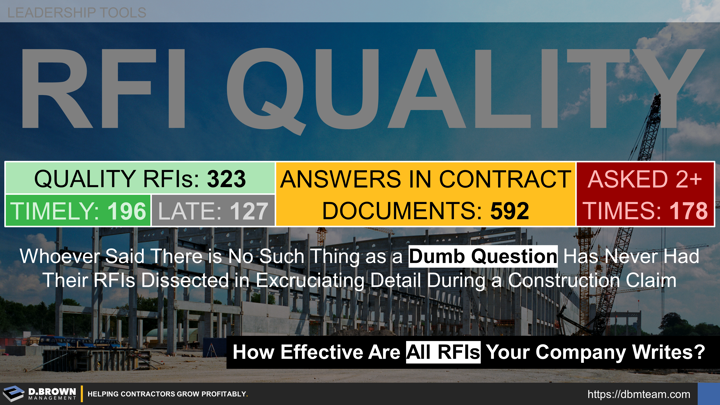Clarity in the construction documents is the basis for:
- Complete Scope
- Cost Estimate / Budget
- Schedule
- Procurement
- Quality Installation
The map is not the territory - just like the plans, specifications, and building codes are not the project.
There will always be gaps and conflicts in both the documents and the interpretation of them. The RFI process is designed to create the clarity required to deliver the project as expected by the project owner. The earlier these clarifications can be made, the better for all parties.
Bringing contractors into the process earlier can create clarity even before the construction documents are finished. That is the value of the Construction Manager at Risk (CMAR) project delivery model and why it is the preferred delivery method for many project owners and contractors.
RFIs should always be based around the principles of "Good Questions," providing appropriate context and possible solutions if applicable.
Routine evaluation of your RFIs the same way they would be evaluated during a construction claim is an invaluable process for improving:
- Project outcomes
- Customer satisfaction
- Project team development
Look at all the RFIs on a project, for a project team, or over a set period of time. Categorize as follows:
- How many of the questions asked had the answers within the contract documents? One or two of these is OK but if it is a pattern, it indicates lack of knowledge about the contract documents which is likely showing up in other areas.
- How many of the questions were asked more than once? Unlikely to happen on a smaller project but increasingly more likely on larger projects or when there is turnover in the project team. Again, one or two is OK but a pattern is usually an indication of deeper problems.
- How many of the RFIs were asked late leading to greater impact to the budget, schedule, and/or quality than necessary?
- How many of the RFIs could have been asked earlier? Even if they were asked early enough to avoid greater impact on the project, developing the capabilities for early identification will lead contractors to becoming involved in the project opportunities before others even know about them.
- How many of the RFIs could have been asked in a materially better way including singular focus for each RFI, appropriate context, backup info, and providing solution options that add value to all parties?
These five buckets identify material changes you can make on the identification and formulation of RFI. This is 100% internally controllable and valuable to measure.
Beyond the RFIs written by your whole team, were there RFIs that should have been written but never were?
Now analyze your document control and process management for RFIs.
- How many of the RFIs were stored and logged as expected? File server, project management software, etc.
- How many of the RFIs were answered when expected - within the terms of the contract or when requested?
- For those that weren't, what did the communication with the customer look like?
- When and how was the lack of response escalated if applicable?
If an experienced but unbiased 3rd party were to objectively evaluate the last 1,000 RFIs sent by your team, what would the results look like?
Going through this process with the managers responsible for key functional areas will help identify improvements to the systems, training, and management around RFIs.
- Preconstruction
- Estimating
- Project Management
- Field Management

